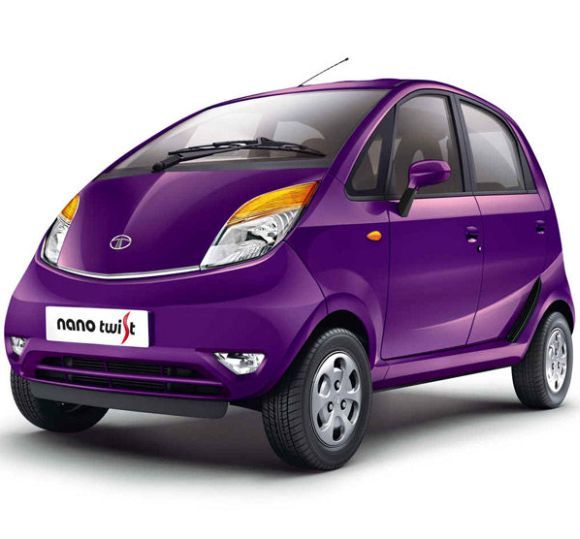
More than a year ago Tata Motors set out to revamp the Nano, accompanied by high-pitched campaigns. But the fortune of the mini car is still waiting to be lifted, even though the lower variants have been taken off the road.
The on-road price of the current Nano, in Mumbai, puts it in nearly the same league of India's largest-selling car, the Maruti Suzuki Alto800.
The Nano Twist (with power steering), which was launched in January this year, costs Rs 292,000 whereas the more powerful Alto800 is priced at Rs 347,000 and the Hyundai Eon is available at Rs 350,000 (on-road, Mumbai).
With Tata Motors phasing out all three first-generation variants, Nano's replacements have not pushed sales but sent prices soaring.
Last year Maruti clocked average sales of 21,500 Alto units every month, while the Hyundai Eon saw 7,200 units. The Maruti Alto800 is powered by a 796-cc engine and a top-speed of 150-kmph while the Nano has a smaller 624-cc engine, with top-speed of 105-kmph.

In an effort to rid it of the tag of a poor man's car and promote it as a regular compact car, Tata Motors phased out the low-cost standard, CX and LX variants that debuted in 2008 over the last one year. The phase-out reinforces the new positioning of being an aspirational mini city car.
The car's standard variant which carried a tag of Rs 100,000 (Rs 130,000 on-road) kept alive the promise of Ratan Tata, former chairman of Tata Motors and also the brain behind the car. However, it was a barebones model, without even air-conditioning.
The CX came with just air-conditioning and a few tiny additions. The LX came loaded with the CX features and body-coloured bumpers and power windows.
These readjustments for the troubled car has cost the company.
Volumes of the Nano fell to less than a third last year compared to its best year till date. Last year, the Nano had sales of 21,129 units, a 61 per cent fall compared to 53,848 units sold in 2012-13, according to the Society of Indian Automobile Manufacturers.

The Mumbai-based company took five years to sell the 250,000 units of the Nano - its capacity to build in a single year. With inventories piling up at its warehouses, Tata Motors was forced to shut down the Sanand, Gujarat plant for three-six weeks in June with capacity utilisation dipping to almost 10 per cent.
The Twist variant has not shored up sales by a lot. Consumers get a power steering that has become almost standard in city cars. A Tata Motors employee tasked with marketing the Nano, however, says the 650-kg car does not need power steering but the feature brings it at par with competition.
The eMax variant (CNG) launched last October, though, is witnessing better demand than the Twist. With a claimed mileage of 36-kms-per-kilo of CNG, it is the most fuel-efficient derivative of the Nano.
"We were projecting sales of 200-300 units of the Nano Twist every month but today we are selling no more than 40-50 units per month. The CNG model is doing better, instead. Overall, it has been very disappointing", says a prominent Mumbai-based Tata dealer.

Future salvo
While making its current models work harder, by competing with the Alto800 and Eon, Tata Motors is also lining up its future salvo. Sources say that a more powerful variant, which is likely to be powered by a 800-cc petrol engine, could be launched next year.
In addition the automatic manual transmission technology seen in the compact sedan Zest will be extended to the Nano. Plans to launch a diesel variant, however, got shelved due to technical issues.
Mayank Pareek, president (passenger vehicle business unit), Tata Motors, who joined from Maruti Suzuki, says "A lot depends on the marketing of a product and appropriately segmenting and targeting it. There's demand (for the Nano)".
Market watchers believe that Tata Motors' move to upgrade the Nano to compete with the current market leader in the small car segment is a decision taken in the right direction.
Many car enthusiasts and owners of the Nano believe that the 625-cc car is underpowered for four or more occupants, despite having more cabin space than competition.
"There has been a drastic change in the overall buying behaviour and expectations of car consumer in India in recent times. Tata Nano is one such instance which is a resultant of this whole shift. The idea to reposition the car is finally taking place", says a Mumbai-based analyst.











